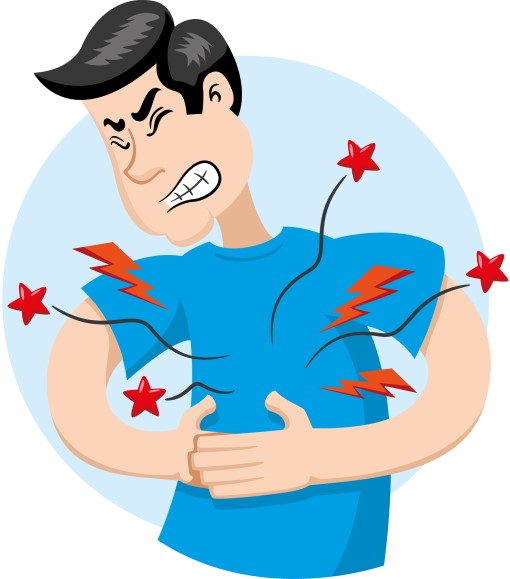
Can pain make sleep apnea worse? – What we know and what to try
By Jason Wooden, PhD | September 27, 2021
If you’re curious whether pain can make sleep apnea worse, it’s no surprise since 55% of obstructive sleep apnea patients live with chronic pain.
The ways it could worsen sleep apnea include causing more stress, inflammation, and keeping you from sleeping on your side. Pain meds may also increase your risk for sleep disordered breathing.
There are plenty of pain remedies worth a try including exercise, physical therapy, dietary changes, massage therapy, and a variety of natural remedies.
Why it’s not so crazy pain could make sleep apnea worse
Living with sleep apnea and what it does to your life is tough enough.
So, pain or anything else that could make sleep apnea worse is to be avoided like the plague.
Every night one in three adults struggle with sleep around the world.
It’s hard to say how much pain is part of the problem for the millions of sleep apnea sufferers, but we do know it’s a general issue for sleep.
Did you know that over 100 million Americans suffer from chronic pain and over 70 percent of them have sleep issues?
With nearly a billion people living with sleep apnea worldwide, you’re likely the only one curious about its connection to pain.
Pain is a signal from your body telling you something is wrong.
Besides giving you an uncomfortable sensation, pain affects the body in other ways too.
Your blood pressure may rise, your breathing may quicken, and stress hormones are released.
No surprise given how interconnected our bodies are.
Could pain affect things like sleep apnea too?
Let’s take a look at what we know and what you can do to keep pain from making your nights worse.
3 ways pain can make sleep apnea worse
There’s more to this issue than most people realize.
Would you believe studies have found that 55 percent of obstructive sleep apnea patients also experience chronic pain?
So, there’s definitely a connection between pain and sleep apnea. Whether it’s a direct or indirect connection, it’s hard to say.
Nonetheless, there’s more than one way in which pain could be making your sleep apnea and nights worse:
1) Pain adds to the stress
Living with ongoing pain can be pretty stressful. Feeling uncomfortable and unable to sleep at night is stressful too.
What’s more is that stress can cause tension and knots in the body which can make you even more uncomfortable.
All of this is bound to add to the misery of coping with sleep apnea.
2) There’s more inflammation in the body
Experts now view obstructive sleep apnea, the most common sleep apnea type, as a low grade chronic inflammatory disease. They have found that these patients have upper airway and systemic inflammation.
And, in studies, sleep apnea severity has been found to track with high levels of inflammation – the worse the sleep apnea is the more inflammation found in the body.
Unfortunately, chronic pain triggers the body to pump out stress hormones which can put you in the “fight-or-flight” state and cause even more inflammation.
3) It’s hard to sleep on your side
Many people who suffer from obstructive sleep apnea are “position-dependent”. Their symptoms are actually worse when they sleep on their back, presumably because the tongue relaxes back towards the throat leading to even more obstruction.
It turns out the over half of obstructive sleep apnea patients are “position-dependent”. One of the treatments for them is positional therapy, an approach which encourages people to sleep more on their sides so that the throat is less obstructed and they get more restful sleep.
Depending on where on the body your pain is, it can make harder to sleep on your side which means your sleep apnea will be worse.
I wouldn’t be surprised if you’re dealing with more than one of these issues.
What’s really bad is that poor sleep can increase your sensitivity to pain. If you’re not careful, you can get into a vicious cycle where poor sleep leads to more pain and pain leads to more poor sleep.
Your pain meds could be making your sleep apnea worse
Many people suffering from long-term chronic pain use opioids which are among the most powerful prescription pain killers you can get.
Among the most commonly prescribed pain meds are:
- codeine
- fentanyl
- morphine
- oxycontin
- Percocet
- Vicodin
While opioids may seem like a godsend if you’re struggling with aches and pains, they can make it harder to fall asleep, stay asleep, and get deep restful sleep.
One study found that 89 percent of patients taking opiate meds for back pain had their sleep disrupted!
Another way pain meds could make things worse is that opioids may increase your risk for sleep breathing disordered breathing which is what happens when you get sleep apnea.
Other things besides pain that can make sleep apnea worse
Pain isn’t the only thing that could be aggravating your sleep apnea symptoms.
Keep in mind that obstructive sleep apnea, the most common type, happens when the muscles in the throat relax too much during sleep. This is what restricts airflow and causes you to wake up repeatedly during the night.
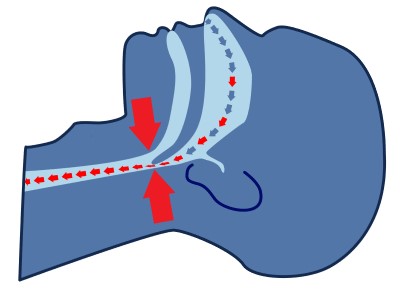
Some of the things that could affect airflow and worsen your symptoms are:
Weight – about half of people with sleep apnea are overweight
Enlarged tonsils or tongue – may block the airway
Alcohol, sedatives – they relax the muscles in your throat
Smoking – may irritate and inflame the upper airway
Allergies, nasal congestion – you’re more likely develop sleep apnea if you have difficulties breathing through nose
Junk food – Some of your favorite foods and snacks unfortunately can cause more inflammation in the body
20 Pain remedies worth a try for sleep apnea sufferers
Now that we’ve talked about the connection between pain and sleep apnea, you’re probably wondering about your options.
Well, there’s actually quite a bit you can do so that pain doesn’t make your nights and sleep apnea worse. Depending on your situation and interests, there’s a variety of pain remedies you can try.
1) Pain meds
Yes, this is obvious, but I had to include it on the list.
You’ve probably tried popular over the counter pain relievers like acetaminophen (Tylenol) and ibuprofen (Advil). There’s also the more powerful prescription painkillers are opioids such as codeine, morphine, oxycodone, and Vicodin.

One thing you should keep in mind is that pain meds have serious downsides. Long-term use has been linked to many other health problems.
They’re also addictive and over time you need higher amounts to get the same effect. Some may eventually make you more sensitive to pain.
2) Get more sleep
Given how much sleep affects pain, it should be no surprise it’s also near the top of the list. Bottom line, it’s important to prioritize sleep so you’re making the best of your sleep opportunities.
Start with your sleep hygiene, the everyday habits can set the stage for deep restful sleep. Poor sleep hygiene can sabotage everything else you’re doing to improve your sleep.
What good is it if your sleep apnea treatment is working but you’re up into the wee hours of the morning because you’re drinking too much cola?

For better sleep hygiene, sleep experts suggest you:
- keep consistent wake up & sleep times
- avoid naps
- exercise during the day
- avoid large meals, alcohol, or stimulants such as caffeine before
- bedtime
- maintain a regular bedtime routine
- avoid using TVs, laptops, or other electronics before sleep
- keep your bedroom dark, cool, quiet, & relaxing
Learn more:
Sleep Hygiene Checklist
3) Try an ice pack
Cold can help numb pain, fight inflammation, and reduce swelling. For some it’s enough temporary relief they can at least fall asleep.
You can try putting ice on your shoulder for 15 minutes.
4) Try heat
Heat can relax muscles and open up blood vessels. This can help the body’s healing process and provide some pain relief.
You can try a warm shower or a heat pack.
5) Turmeric
Turmeric is known for its use in Indian curries and other middle eastern dishes. It’s also been used for centuries in both traditional Indian and Chinese medicine.
Research has shown it’s a powerful inflammation fighter.
Learn more:
10 Proven Health Benefits of Turmeric and Curcumin (Healthline)
Review: How I’m using turmeric curcumin for inflammation, pain, and better sleep
6) Medical procedures
Electrical stimulation and nerve blocks by injection commonly performed procedures. Surgery may be done to fix injuries that healed wrong and contribute to pain.
7) Check your ergonomics
Humans aren’t designed to sit in front of a desk and computer 8 hours a day. The result is injuries to the shoulder, wrist, elbows, neck, back and hands.
Make sure you have an ergonomic setup. Learn more
Likewise, if you’re doing heavy lifting or other repetitive tasks make sure you’re doing it properly. Learn more
8) Watch your posture
Poor posture can place stress on the spine and lead to back pain. Pay more attention to how you sit, walk, and lift objects. Learn more
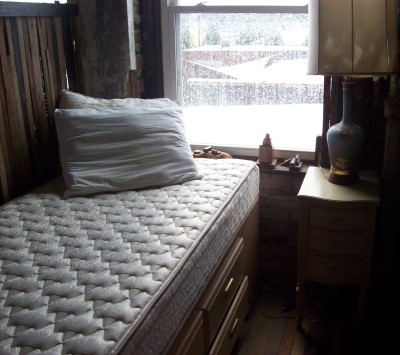
Find a mattress that works better for your body type and the way you sleep.
10) Physical therapy
Physical therapy is good for strengthening muscles and increasing flexibility which can help keep you from aggravating old injuries and getting new ones.
It’ll also increase blood flow and reprogram your nervous system to make it less sensitive to pain.
11) Exercise
Contrary to what you may think, studies have found exercise can help people manage their pain. Low impact and gentle activities such as walking or swimming can help improve your pain threshold.
Exercise will also help your sleep apnea and sleep.
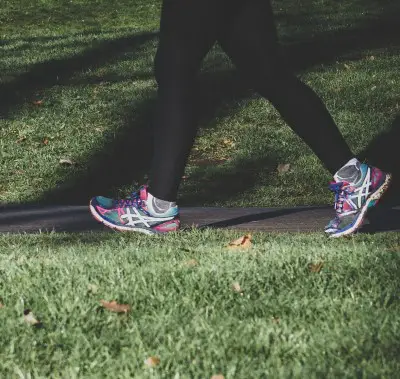
Depending on how serious your pain situation is and your physical condition, it’s worth checking with a doctor about the best activities for you.
12) Try an anti-inflammatory diet
Did you know that some of your favorite foods can trigger inflammation in the body and worsen pain?
Some foods to avoid are:
- sugary drinks, snacks, and desserts
- refined carbs (white bread, white pasta)
- processed meats and foods
- processed soybean and corn oils
- trans fats
- excessive alcohol
Anti-inflammatory diets have grown in popularity as a natural way to help the body heal. They focus on avoiding specific foods shown to increase inflammation in the body and consuming more foods believed to be fight inflammation.
13) Massage therapy
Massage therapy helps relieve pain through relaxing painful muscles and joints, reducing stress and anxiety, and overriding pain signals.
14) Acupuncture
Acupuncture is derived from traditional Chinese medicine, developed over a period of more than 2000 years. It works by stimulating specific points on the body with thin needles.
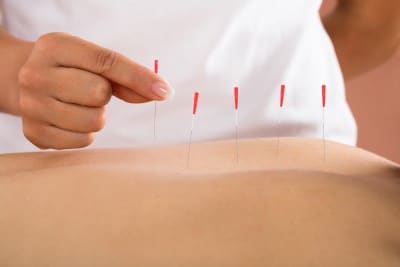
It’s been shown to be useful for a wide variety of ailments including pain.
15) Psychotherapy
Did you know that pain has biological, psychological, and emotional factors? Psychotherapy can change the way you cope with their pain and change the stress response in the brain responsible for the release of chemicals that make pain worse.
16) Music therapy
Studies have shown that music can promote relaxation and help relieve pain. It alleviates anxiety and stress which can contribute to pain.
17) Tai chi
Studies have shown Tai chi can help people manage pain. It uses breath control, meditation, and gentle movements to stretch and strengthen muscles.
It can also relax the body and reduce stress.
18) Yoga
Similar to Tai chi, yoga uses breathing, meditation, and stretching. It calms the body and mind which can help reduce stress that triggers pain.
19) Meditation
Meditation can be used to calm the mind and the body. It helps reduce the stress response.

If you’re serious about sleeping better, don’t forget these other things
You’re already dealing with sleep apnea and pain, so why make things harder than they have to be?
Be sure to address everything you can, especially underlying issues.
Get your sleep apnea treated
If you’ve haven’t already, get in to see a sleep specialist so you’re officially diagnosed sooner rather than later. Also, untreated sleep apnea can increase your risk for serious life threatening health complications.
Make sure you have a sleep apnea treatment that’s working for you. Some people have a hard time with CPAP, the most commonly prescribed treatment, and give up.
That’s for sure will prolong the misery. The good news is that today there are plenty of alternatives to try – positioning devices, innovative neural therapies, and surgical implants.
Learn more:
The latest CPAP alternatives
Can’t afford CPAP because of insurance?
Get a check up
Too many people are unaware how many other medical issues can cause problems or worsen sleep. This includes things like asthma, allergies, acid reflux and heartburn, heart issues, chronic pain, and diabetes can keep you up at night.
Even prescription drugs can cause or worsen sleep issues.
A doctor can help you identify and work through any underlying issues that may be making it harder to get good sleep.

Reach out for help
Depression is very common among people who have chronic pain. Unfortunately, depression and anxiety can make it hard to sleep.
What’s more is that poor sleep can increase your risk for anxiety and depression.
So, if you’ve been feeling down a lot lately, it’s worth having a chat with a therapist.
Sources:
1. “Talking Points”, World Sleep Society website
2. The prevalence and awareness of sleep apnea in patients suffering chronic pain: an assessment using the STOP-Bang sleep apnea questionnaire, Nat Sci Sleep. 2018; 10: 217–224.
3. Estimation of the global prevalence and burden of obstructive sleep apnoea: a literature-based analysis, Lancet Respir Med. 2019 Aug; 7(8): 687–698.
4. “Know how pain receptors work and learn about psychological and physiological effects of pain”, britannica.com
5. Chronic widespread musculoskeletal pain in patients with obstructive sleep apnea syndrome and the relationship between sleep disorder and pain level, quality of life, and disability, J Phys Ther Sci. 2015 Sep; 27(9): 2951–2954.
6. “Obstructive sleep apnea linked to inflammation, organ dysfunction”, ScienceDaily
7. Upper airway and systemic inflammation in obstructive sleep apnoea, European Respiratory Journal 2016 48: 1108-1117
8. Positional therapy in the management of positional obstructive sleep apnea-a review of the current literature, Sleep Breath. 2018 May;22(2):297-304.
9. Sleep abnormalities associated with alcohol, cannabis, cocaine, and opiate use: a comprehensive review, Addiction Science & Clinical Practice volume 11, Article number: 9 (2016)
10. Disrupted sleep patterns and daily functioning in patients with chronic pain, Pain Res Manag. Summer 2002;7(2):75-9.
11. “Chronic opioid therapy can disrupt sleep, increase risk of sleep disorders”, 2019, American Academy of Sleep Medicine website
12. “Pain Medication Side Effects”, 2020, Verywell Health
13. “Why opioids make pain worse”, HealthPartners website
Connect with us:
About Us
Better Sleep Simplified® was founded as a place for you to get clear and well-researched information.
Our goal is to make sure you know about your options so that you take action sooner rather than later.
Check us out on YouTube:
Watch and Learn
Helpful sleep tips, interesting sleep facts and statistics you want to know about
Affiliate Disclosure
This site is a participant in the Amazon Services LLC Associates Program and other affiliate advertising programs designed to provide a means for sites to earn advertising fees by advertising and linking to them.
Important: BetterSleepSimplified.com is for informational purposes only and is not intended or implied to be a substitute for professional medical advice, diagnosis, or treatment. Always consult a physician for sleep and health concerns. See additional information.


